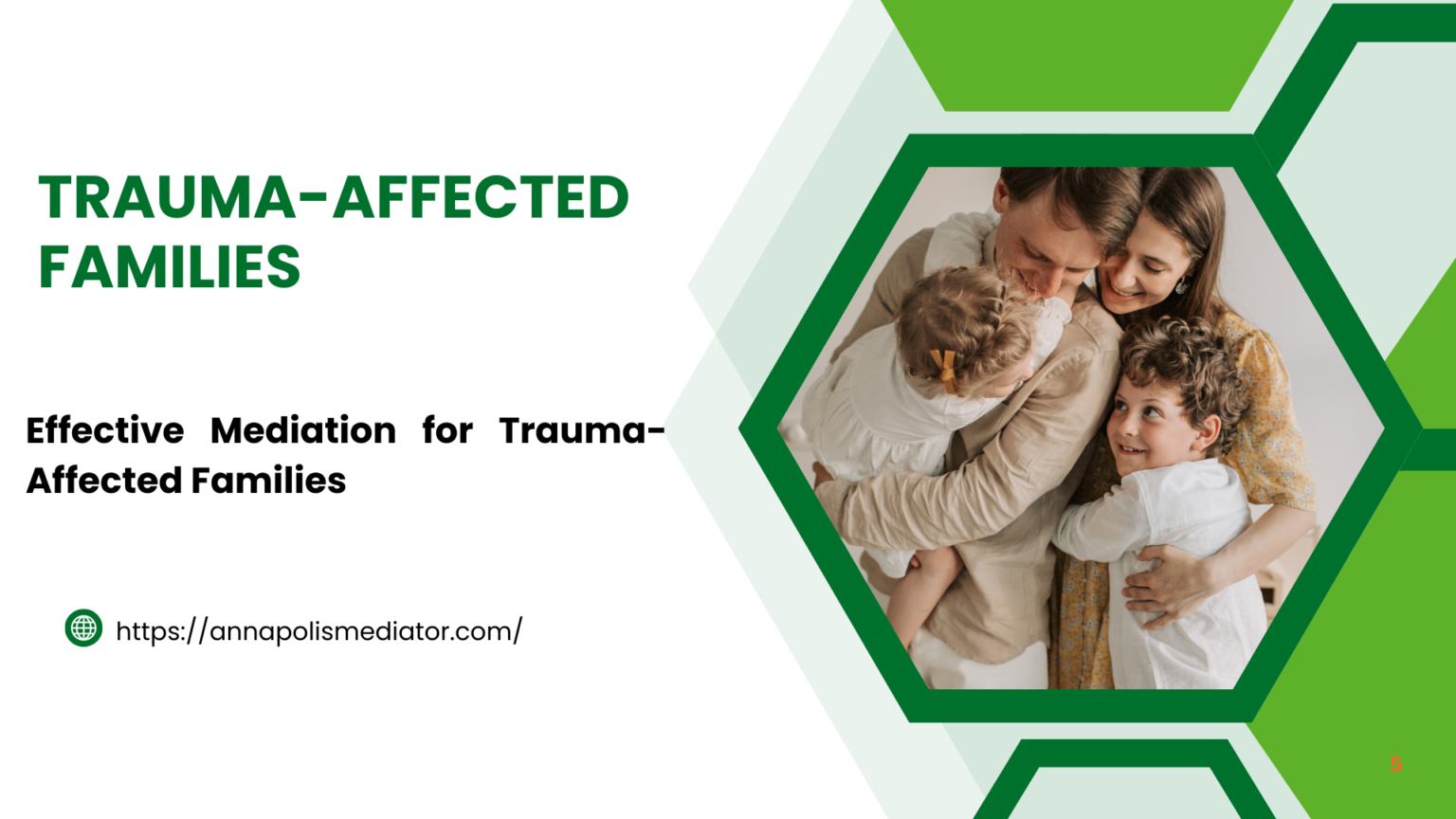Effective Mediation for Trauma-Affected Families
Trauma has a profound impact on individuals and families, influencing communication patterns, emotional stability, and decision-making abilities. For families affected by trauma, mediation offers a compassionate and solution-focused approach to resolving conflicts while addressing the underlying emotional challenges. Effective mediation provides a safe space where all parties can be heard, and it encourages healing and positive outcomes.
In this article, we’ll explore the essential elements of mediation for trauma-affected families and offer practical strategies for ensuring the process is successful.
1. Understanding the Impact of Trauma
Trauma can result from various experiences, such as abuse, loss of a loved one, divorce, or financial instability. These events often lead to heightened emotional responses, difficulty trusting others, and communication barriers. A skilled mediator recognizes these dynamics and approaches the mediation process with empathy and patience.
By creating a trauma-informed environment, mediators can reduce feelings of fear or defensiveness, enabling family members to engage in meaningful discussions.
2. Choosing the Right Mediator
Selecting a mediator who is experienced in working with trauma-affected families is crucial. These professionals understand the emotional triggers that may arise during mediation and have the skills to manage them effectively.
Look for mediators with certifications in trauma-informed care, family therapy, or conflict resolution. Their expertise ensures that the mediation process remains constructive, even when emotions run high.
3. Establishing a Safe Space
For families dealing with trauma, creating a safe and supportive environment is essential. This includes setting ground rules for respectful communication, ensuring confidentiality, and allowing breaks when needed.
A trauma-informed mediator will also pay attention to nonverbal cues and adapt their approach to ensure that all participants feel comfortable and respected throughout the process.
4. Focusing on Future Solutions
While it’s important to acknowledge past events, mediation for trauma-affected families should prioritize future-oriented solutions. This involves identifying shared goals, such as co-parenting plans, financial agreements, or communication strategies, and working collaboratively to achieve them.
By focusing on the future, families can begin to rebuild trust and create a foundation for healthier relationships.
5. Active Listening and Empathy
Mediation sessions should emphasize active listening and empathy. When family members feel heard and validated, they are more likely to engage in productive discussions and work toward solutions.
Mediators can model these behaviors by summarizing what each participant shares, acknowledging their emotions, and reframing negative language into constructive dialogue.
6. Managing Emotional Triggers
Trauma often leads to heightened emotional responses, which can derail the mediation process. Mediators must be equipped to manage these triggers by de-escalating conflicts, redirecting discussions, and providing tools for self-regulation.
Techniques such as breathing exercises, grounding techniques, or guided reflections can help participants regain control of their emotions during challenging moments.
7. Incorporating Supportive Resources
Mediation for trauma-affected families often requires additional support from therapists, counselors, or social workers. These professionals can provide insights into the family’s dynamics and offer strategies for addressing deep-seated issues outside of mediation sessions.
Mediators should collaborate with these resources to ensure a holistic approach to conflict resolution and healing.
8. Flexibility in the Mediation Process
Every family’s experience with trauma is unique, so mediators must be flexible in their approach. This may involve adjusting the pace of mediation, accommodating individual needs, or exploring alternative formats such as virtual sessions.
Flexibility allows mediators to adapt to the specific circumstances of each family, ensuring that the process remains effective and supportive.
9. Building Trust and Accountability
Rebuilding trust is a critical aspect of mediation for trauma-affected families. This involves creating agreements that are clear, achievable, and mutually beneficial.
Mediators can help families establish accountability measures, such as regular check-ins or progress reviews, to ensure that commitments are upheld and relationships continue to improve over time.
10. Encouraging Healing and Growth
Ultimately, mediation for trauma-affected families is about more than resolving disputes—it’s about fostering healing and growth. By addressing the emotional and relational challenges caused by trauma, families can move forward with a renewed sense of understanding and connection.
Mediators play a vital role in this process by guiding families toward resolutions that prioritize their emotional well-being and long-term success.
Why Choose Susan Saunders for Family Mediation?
Susan Saunders, LMSW, is a highly skilled mediator and trauma-informed care specialist serving families in Maryland and Florida. With over a decade of experience, Susan has worked extensively with families facing high-conflict situations, mental health challenges, and the lasting effects of trauma.
Certified in Intimate Partner Violence Evaluation and Litigation and Trauma Training, Susan’s compassionate and solution-focused approach helps families navigate even the most complex disputes. Her background in addiction and homelessness provides her with a deep understanding of family dynamics, making her an invaluable resource for families in need of mediation.
Susan is dedicated to empowering her clients and fostering peaceful resolutions. If you’re looking for a mediator who combines expertise, empathy, and a commitment to positive outcomes, Susan Saunders is here to guide you every step of the way.
Contact Susan Saunders today to take the first step toward healing and resolution for your family.


